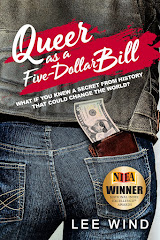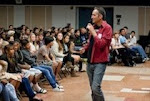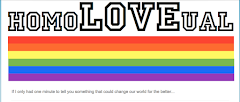


How many times do kids watch the Disney movies about the wonderful Disney Princesses, who fight for and ultimately win their TRUE LOVES, and then live happily ever after?
Is it at nine viewings of "Cinderella 3: A Twist In Time" when the notion that TRUE LOVE is more powerful than even the fairy Godmother's stolen magic wand starts to be imprinted on their psyches? Or does it take an even dozen times to realize that what we all should want is this TRUE LOVE thing, and that the "happily ever after" starts with a wedding ceremony where that love is celebrated and confirmed to the community?
"Cinderella" ends with a wedding.
So does "Cinderella 3"
So does Ariel's story in "The Little Mermaid"
Okay, so we all watched these movies as kids, and now today's preschoolers are starting their indoctrination into the "magic" of what love and life holds in store...
Only, there's a betrayal for those of us boys who realize our TRUE LOVE is another Prince. Or for those of us girls who wish to find another Princess.
There's so much hub-bub among "concerned parents"and the "religious right" that exposure to the paltry few picturebooks that feature happy same-sex couples and families could somehow influence their children to be gay.



Books like "King and King" and "And Tango Makes Three" and even "The Family Book" by Todd Parr.
Well, I was exposed to an awful lot of heterosexual "propaganda," was raised by straight parents in a culture that was ALL about my finding a girl and getting married, and it didn't make me straight.
What I did take away from all those Disney films was a gender-adjusted goal:
I wanted TRUE LOVE with a "Prince", and I knew that when I finally found him, it would be celebrated with a wedding ceremony. Beyond that my plans were a little fuzzy...
Now I didn't have any elaborate plans about the wedding, and frankly, I didn't spend a lot of time daydreaming about that day...
But I knew that, just like everyone else watching those Disney Movies, that I was the star of the movie of MY life, and that I wanted a Happily Ever After as much as anyone, animated or real.
And while I'm blessed enough that I FOUND my Prince almost 11 years ago, and we had a religious wedding ceremony, and we're raising a daughter together, we're still not able to be
legally married in our state or our country.
So now, when it seems possible that the California Supreme Court may finally make Gay marriage legal in our State (after our disappointing Governor Schwarzenneger twice vetoed Gay Marriage Bills that our amazing representative Mark Leno -and other brave politicians - championed through the state legislature), there are signature gatherers out all over the state, trying to get enough signatures to put an anti-gay marriage measure on the ballot. Trying to get a sense of fear and mob mentality stirred up (and trying to get more reactionary conservatives to the polls during the presidential election cycle in November) to take away any rights we as a minority may have been on the verge of achieving...
As
Chief Deputy City Attorney Therese Stewart (representing San Francisco and the lead lawyer arguing before the California State Supreme Court) said so beautifully last Tuesday, this isn't about the tradition of one man and one woman marrying - no one's suggesting we take away that right.
We're fighting the tradition of discrimination, the tradition of denying gay men and women access to legal marriage.And I can just imagine the day that there's a Disney-quality animated musical about two Princesses (or two Princes!) who fall in love, and who, despite all odds, get to live happily ever after. I'll cheer that TRUE LOVE all the way from the Disney On Ice spectaculars to the character pajamas!
So, when you see one of these signature gatherers, trying to get YOUR name in support of keeping the tradition of discrimination against all GLBTQ kids, and adults, and gay and lesbian couples and families like mine, I hope you can ask yourself this question:
What would Cinderella do?
Wouldn't she want EVERYone to get to have true love like she has, and to have it recognized and celebrated? I mean, even Anastasia, her mean step-sister, gets to keep the King's seashell at the end of Cinderella 3 and is told "Everyone deserves True Love" by the King himself.
So, what would Cinderella do?

She wouldn't sign.
And she'd walk away, singing about it.
Thanks for thinking about it!
Namaste,
Lee
ps - you can check out Equality For All for the latest on the Anti-Gay Marriage Signature Gathering Effort.

960.jpg)














































